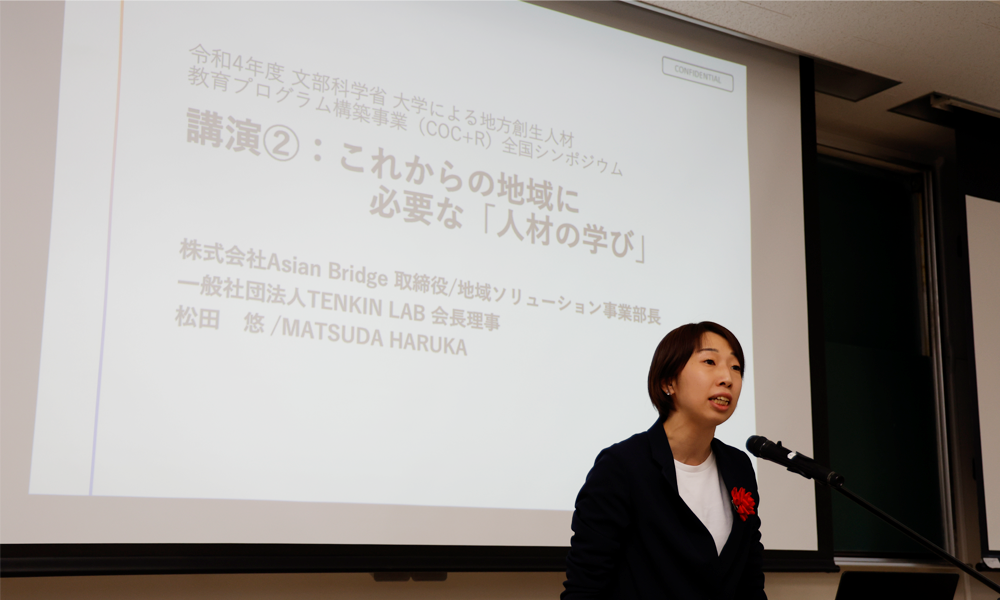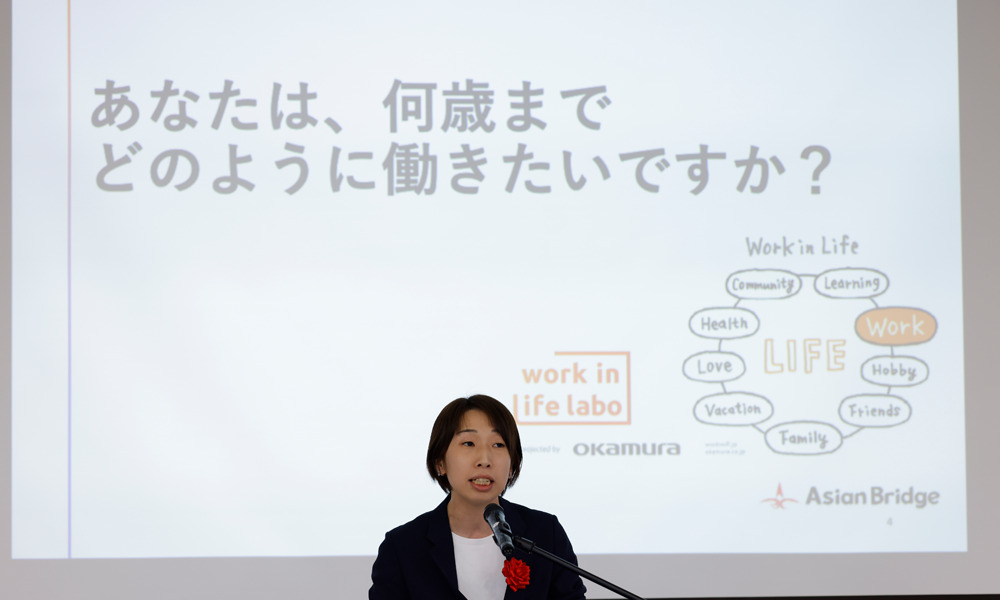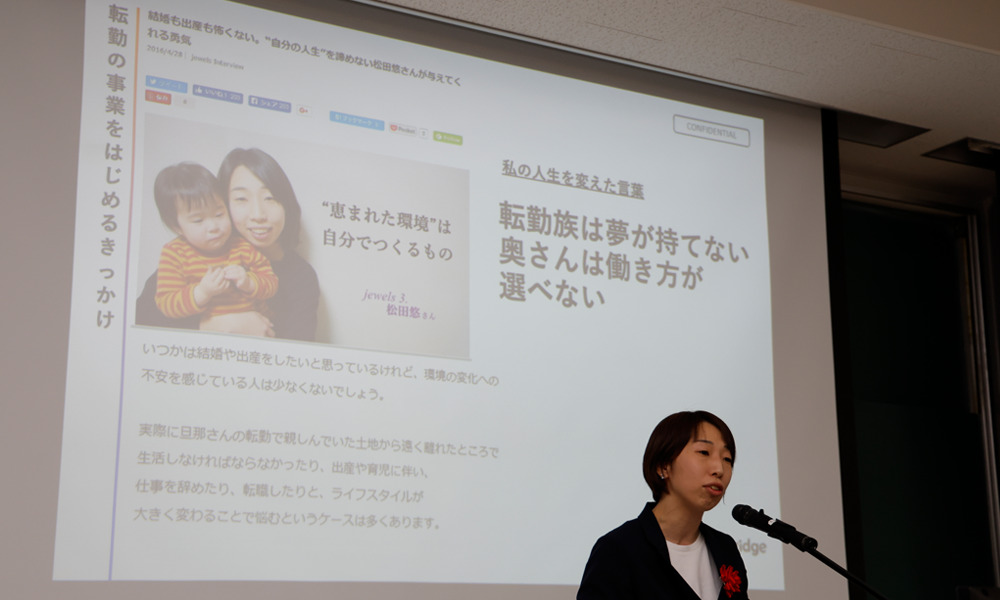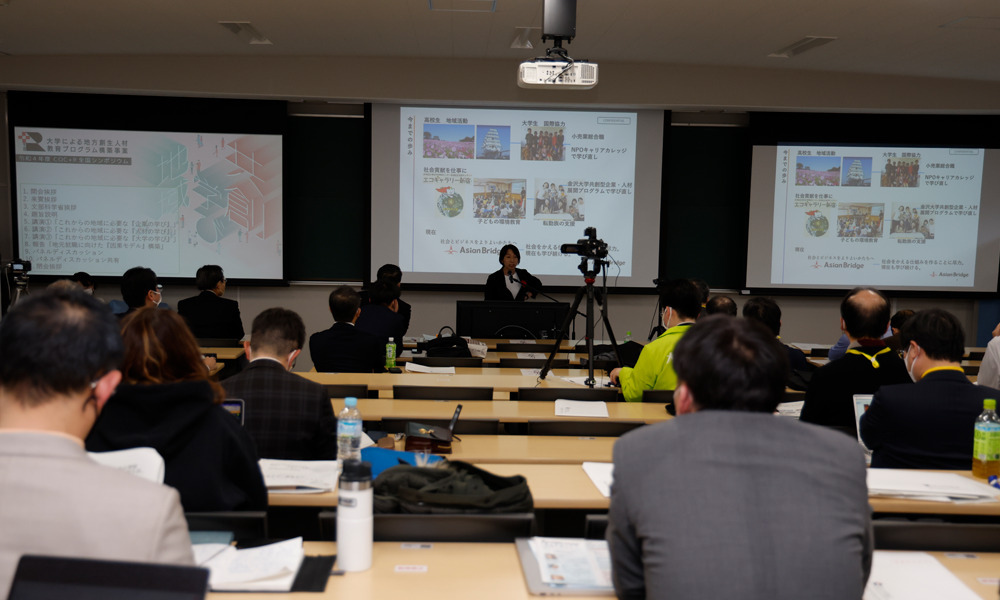Lecture 4 of the 2 COC+R National Symposium was given by Mr. Haruka Matsuda, director of Asian Bridge Co., Ltd. and chairman of Tenkin Lab, from the perspective of "learning human resources."She talked about her own experience, which is related to Matsumoto, career development support for her transfer family, and systematization at an IT company.

Track and field athletes, retailers, and NPOs created life
To tell you about my background, when I was a child, I devoted myself to track and field.When I was a high school student, I also did activities to fill tourist spots with cosmos.I studied urban planning and IT at university, and have even traveled abroad for international cooperation in order to broaden my knowledge.After that, I got a job at a major retailer, but I became interested in how the company was doing a lot of social contribution, and how to commercialize it in the world, so I changed jobs to an NPO that runs an environmental learning information center.I held about 120 classes a year to connect children and the town.It's fun to meet people, and I wanted to do something like this.
Around that time, my husband was transferred, and I was thinking about what to do with my own life, so I became freelance. I qualified as an urbanist.My work is related to the creation of cities, and this is also connected to my high school activities.We are developing a business that connects it with IT to develop careers.
Also, I used to work in Matsumoto when I was a retailer, so I feel very nostalgic today.
9% of Japanese stop studying when they go out into the world

There is data that 9% of Japanese stop studying when they become working adults.However, I feel that studying can make the world a better place.
It is said that 2011% of the children who entered elementary school in the United States in 65 will get jobs that do not exist now.New jobs are popping up all the time, and every day I wonder how my child will live, and I still need to learn.
It is called life-work balance, but we often discuss whether there is work in life or whether there is life in work.I'm currently working and I love working, so it's the latter.I'm from Toyama, and I made a U-turn five years ago, but I realized that there are many good things about the area.At the same time, I learned that there are many people who are working hard to revitalize the region.I would also like to introduce the establishment of a beauty salon in a depopulated area where there are no beauty salons, and the establishment of an aroma village by a pharmaceutical company in Toyama.
The wives of the transfer family want to do something about the work

Until now, there was no corporation dealing with employment support for the wives of the transfer family.So I thought I would do it.The reason why the wives of transferees have no dreams and can't choose how to work is because they don't have a point of contact with society.He noticed it when a slightly depressed wife began to help me with my work and looked happier.
According to data from a survey of the population of transferees, the number is said to be around 540 million.This is about the size of Hyogo Prefecture, which has the 7th largest population in Japan.In addition, there are about 290 million wives, a number that is comparable to the population of Ibaraki Prefecture.It can be said that such people are the largest related population in the region.I found out that there are many people who have a strong desire to work outside and have obtained qualifications.From there, I realized that it is important to have a win-win relationship between the region and the transferees, and now I am developing a platform for related populations and policies with Toyama Prefecture.We are also discussing what kind of learning we can provide to the wives of people who are transferred from the university.
I came across the current Asian Bridge when I had a strong desire to create a society where people who have been separated from society regardless of their will can work lively regardless of their environment.I felt a great possibility that IT solved the confusion.
Connect IT to regional solutions
Asian Bridge is headquartered in Tokyo, but it has a branch office in Kanazawa, and after I joined the company, it opened in Toyama.In Toyama, we started a telework training project for mothers, and are currently creating a system to hand over work to about 100 people.In this way, we are proceeding with system development, cloud services, and content production, and while utilizing the new technology of online distribution, we are also learning new things and working to link them to solutions.
Originally, I think that my encounter with Asian Bridge was related to this COC+R, but it was triggered by participating in the co-creative tourism industry development program at Kanazawa University. IT companies are companies that think about how they can survive in rural areas, so they surveyed about 40 companies to find out the actual situation in order to prevent local sales from being taken to Tokyo.At that time, there were voices saying that the hurdles to introduce IT were too high and difficult.Therefore, we developed a site that provides free job matching as a cloud service.This has resulted in removing barriers to IT adoption.By subscribing to this service, the mothers of the transfer family also support the creation of a second career.
Internships change the way we work

In joint research with Kanazawa University, we also conducted an internship demonstration experiment.One of the mothers decided to get a job at a time when internships for working adults hadn't really taken off.Now, in addition to the Hokuriku Division, we have traveled all over the country and opened an office in Shizuoka.We have established a general incorporated association and continue to work on activities that specialize in the work of migrant mothers.
A ripple effect on local companies began to appear, and when a student intern in the manufacturing industry opened a Twitter account, the people in the company formed a team and started sending out information. spread.This company has also won the Furusato Enterprise Award.In collaborating with local governments, in addition to creating solutions, we are also adopting exit strategies such as internship experience tours and having immigrants.In addition, we have started an EC service in partnership with a local TV station.Moms run it.
At first, it was only targeted at transferees, but it has expanded to involve various people, for example, working with local governments nationwide to promote women's empowerment.I also started to challenge how to make money for the second career of athletes and sports leagues.By expanding the scope in this way, I hope to expand the possibilities of everyone involved.
*The video of the symposium is open to all COC+R members.
●Symposium video list page
https://coc-r.jp/archives/

